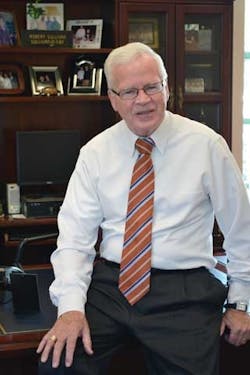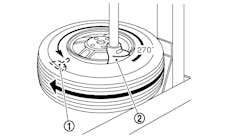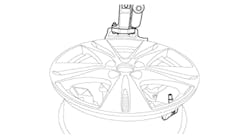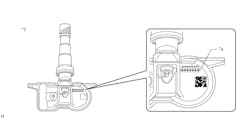Eight years ago, the board of directors of Sullivan Tire Co. Inc. challenged President Bob Sullivan to hire his successor by the end of the year. When he failed to do so, the directors withheld his performance bonus.
“They asked me, ‘Where’s the succession plan?’” says Sullivan. “And I said, ‘We have the people in-house.’ So I invited them to our first LDP (Leadership Development Program) graduation.”
According to Sullivan, the graduation speaker, former Goodyear Tire & Rubber Co. Chairman and CEO Bob Keegan, told everyone in attendance that Sullivan Tire’s leadership program was unique.
“He said, ‘Sullivan Tire is doing the right thing for the future. This is a commitment to develop leaders, and that’s what you need.’
“The board was thrilled after that,” smiled Sullivan, “and they made up for how much they shorted me!”
To date, more than 100 of his employees have successfully completed the program, which Sullivan says will ensure the continued success of the company, and maintain a chain of command that started with Sullivan’s late father, Robert.
“Clearly, we understand if people are not getting ahead,” he says. “If our associates are unhappy, that does not transcend into a good experience for our customers. Keeping our associates happy is a hallmark creed of Sullivan Tire.
“We’re doing things for the next generation. We’re not a one- or two-man band. The company looks bright.”
Sullivan, at 70 years of age, leads by example. He works hard, cares deeply for his employees, and gives back to the more than 70 New England communities in which he does business. As one of his managers says, “You would ‘take the hill’ for the guy.”
Sentiments like that show why Bob Sullivan, despite his modesty, is the de facto leader of one of the most successful independent tire dealerships in the country, and Modern Tire Dealer’s 2012 Tire Dealer of the Year.
Adding real estate
Bob Sullivan spends a lot of time behind the scenes growing the company.
In the last 10 years, Sullivan Tire’s store count has increased 50%, from 50 to 75 outlets. There are seven more on the drawing board.
Most of the stores are Sullivan Tire & Auto Service centers. Fifteen are predominantly commercial outlets. The company also runs three Bandag retreading plants.
“I like real estate,” he says. “I love sports — I played a lot of baseball growing up — and I also like the competitiveness of real estate.”
His philosophy takes into account both the draw of the location and the state of the economy. He readily admits that deals can be made when times are tough.
“The real estate market goes up and down, and if you’re patient, you can get a great location. We’ve grown a lot in the last few years when the economy was bad. We purchased stores that we normally wouldn’t have been able to afford in a good economy. There is a lot of competition for locations.”
Sullivan’s secret to expanding is threefold:
1. Financial stability. “You have to have excellent credit.”
2. Real estate expertise. “You have to have a good rapport with a top real estate agent. Ours is Mark Donahue.”
3. Own vs. lease. “I want to own the land if possible. We own the land on 35 of our properties. It is to protect the future.”
Taking over other dealerships starts with a realistic return on investment, according to Sullivan. A soft touch with the owners doesn’t hurt.
“We’re up front with them when we go in, and what we usually say to them is, ‘If you can take the numbers you’re going to give us and show a profit while treating your people great, then we can negotiate.’ But if the owner’s trying to make a killing, and disregarding the customer and his employees, and it will change how the operation is run, we just walk away.
“I look at the 1,000-plus employees who work for Sullivan Tire as the stockholders of the company, and we have an obligation to them to make sure things are done right. If we try to do something that isn’t right — for example, if we try to value our relationship more than it’s worth with the supplier — nobody gets a return. You can negotiate with the supplier to give them market share, but it’s very complex. You have to have a competitive price.
“We try to treat our customers at a high level and the people who work for Sullivan Tire at a high level, so we need to make a little more profit than somebody who doesn’t care about those things.”
Sullivan recently was having a tough time finalizing the buyout of a local tire dealership. The owner said he offered the same benefits to his people that Sullivan Tire did.
After he looked at the numbers, Sullivan discovered there was a $4,000 difference in benefits — in favor of Sullivan Tire’s employees.
“So basically, the day his people come to work for us, they get a $4,000 raise,” says Sullivan. “Those are the things that make you feel good when you do take over a competitor.
“Everybody’s going to benefit. We’re going to get more market share, and the people who are coming to work for us are going to say we are treating them well. A lot of times, the employees are the ones who suffer in a buyout.”
Not everything works out. “We’ve had to close some stores,” says Sullivan. “If at the quarterly meeting I look at the chalkboard and see red in an area, maybe it’s not working there. Sometimes X equals X.”
Mentoring from within
The Leadership Development Program was the brainchild of Sullivan’s second wife, Susan. (The company’s Chrystine M. Sullivan Memorial Foundation was named after his first wife, who died of breast cancer at age 49.)
“Susan was in charge of human resources with Delta Airlines,” says Sullivan. “She knew the board was worried about succession, so she designed the course.”
Fifteen to 17 employees enter the program every year. First, they are nominated by program graduates. Then the list of nominees is sent to the different departments in the company for “their stamp of approval” and whittled down.
“We give them each a mentor,” says Sullivan. “The mentors now are someone in the company, but when we first started this program, I went out and got mentors from the outside.
“I picked out two bank presidents; a lot of entrepreneurs like Pat McGeoghegan from Mohawk (Rubber Sales Inc.); the CFO of a hospital; a fellow who owns a petroleum distribution business — people I had recognized as having good skills. And I asked if they would meet four to six times a year with a key person at Sullivan Tire to help them develop their leadership skills.”
After they complete the program, the students meet with Sullivan for two hours one-on-one. Some of them say it can be very intimidating, although that is not Sullivan’s goal.
“I ask them some questions. This is the first: ‘What are the top three things you learned from the class, about leadership, about yourself and about how you do your job?’ Then I ask them ‘How are you going about transferring these learning center actions to your job? What actions are you doing differently from before? What difference in results have you seen?’ That will be a big topic.
“Then we’ll discuss the answers. I also respond to their questions.”
Marketing Manager Mark Gillard says Sullivan may be the biggest mentor of them all.
“I just think for a president of a company this size to have those one-on-one meetings really just shows he cares.”
“He leads by example,” says younger brother Billy Sullivan, 59, retail supervisor for New Hampshire and Maine. “He’s very motivating. You could be down in the dumps but he always finds a way to bring the positive out of a negative situation.
“He has a lot of compassion for the business, like all of us. He’s fun to be around.”
Negotiating price
Sullivan Tire recently celebrated its 40th anniversary buying direct from Goodyear. Ironically, Goodyear turned the company down when it was a one-store operation in Rockland, Mass.
“We bought a building in Norwell, our second location, and it had gas pumps,” says Sullivan. “A guy from Atlantic Richfield Co. (ARCO) asked if we would like to buy Goodyear’s from them, and we became their biggest customer of tire and battery products.
“When Goodyear and ARCO had a falling out, Goodyear came back and signed us direct, so we came in the back door!”
In addition to Goodyear, Sullivan Tire stocks, in alphabetical order, BFGoodrich, Bridgestone (also the company’s best-selling truck tire brand), Continental, Dunlop, Firestone, Fuzion, General, Hankook, Kelly, Kumho, Michelin, Pirelli, Sailun, Sumitomo, Uniroyal and Yokohama.
“We’ve added some brands over the years, but we very rarely change brands,” says Brian Gollub, manager of purchasing and distribution. “We like to think we’re loyal, and we like to stick with things that work for us. We like to develop a brand essence.
“We don’t go shopping around looking for the cheapest price at any point in time. We generally stick with what we have and try to negotiate our best price point within our relationships. We’re good negotiators. I think we drive a good bargain for our company to the extent we can within the confines of the industry.”
Price escalation and rising raw material costs over the last couple of years didn’t leave dealers with much negotiating room, according to Gollub. Neither did 2009’s “Cash for Clunkers” program, which created replacement shortages by increasing the demand for tires at the original equipment level.
Now the pendulum has swung back in favor of the dealers, especially with the 25% tariff on consumer tire imports from China set to come off on Sept. 26, 2012. Gollub says he’s already seen some “forward impact” in anticipation of the tariff being removed.
“On top of that, we’ve gone from having high backorder rates to plenty of product. And rubber prices have been down, so there’s deflation. So for the first time in several years, we have a little bit more leverage in the negotiations. It feels good for a change to be a little bit more in the driver’s seat.”
Gollub says purchasing is a difficult process to manage.
“Stability is the best thing for us in the purchasing world. Deflation and inflation are both much harder to manage because you can get caught on either side and end up with product at the wrong price. We do our best to try to be smart in how we manage that.”
Sullivan Tire has retail outlets in four states: Massachusetts, New Hampshire, Rhode Island and Maine. Four of its 15 commercial outlets are located in Connecticut. Gollub says Sullivan Tire prices its tires consistently store to store and state to state.
“We stick with our pricing philosophy, one price that we put out there, whether it’s in Maine or Connecticut, Rhode Island — wherever that part of the company is. But we also allow the stores to have some flexibility in their discussions with the customer.
“We have an aggressive price point out there right now, but if we have to match somebody we will, and if we have to strike a deal because somebody has economic challenges and we’re trying to help the customer out, we will. The stores are allowed to make a deal that makes sense.”
Gollub says within Massachusetts, there are “pockets of relatively successful economies and some cities that are really struggling, some of the old-line mill cities. That’s why we have so many brands and so many price points. We have something that will fit everyone’s needs because we have such a vast inventory of products.
“We don’t usually have any problem fitting the need, and we have a good distribution system. So if a tire happens to be in Rhode Island today it can be in Maine within 24 hours, generally, through our system.”
Giving back
Bob Sullivan and younger brother Paul Sullivan, the vice president of marketing, credit their father for creating team spirit at Sullivan Tire.
“People don’t want to disappoint the culture,” says Bob. An atmosphere of philanthropy goes along with that.
“I think as a company, we try to give back more than our share if we can. Our mission is not to turn anyone away.”
The Chrystine M. Sullivan Memorial Foundation has raised more than $2 million, most of it funding cancer support. With the help of the foundation’s annual Champions Fighting Cancer Walk, $50,000 a year is earmarked for The Ellie Fund, an organization that fights breast cancer and cares for women and their families across Massachusetts.
The Sullivan family also started and manages the Bob Sullivan Memorial Foundation, which awards academic scholarships; and the David M. Sullivan Foundation, named after Bob’s late brother.
David, formerly head of purchasing and treasurer of the company, died of a heart attack in 2006 at age 60. He was known for his good deeds and compassion for the underdog, according to Paul, 61. His foundation provides help for the less fortunate, such as Christmas presents for needy children.
Sullivan Tire recently presented a $20,000 check to the 11th annual WEEI (radio)/NESN (cable television) Jimmy Fund Radio-Telethon. The donation was part of the company’s “Every Hit Helps” summer promotion.
The Jimmy Fund supports the fight against cancer in children and adults at Boston’s Dana-Farber Cancer Institute. Sullivan Tire agreed to donate $500 to the telethon for every hit by Dustin Pedroia, the second baseman for the Boston Red Sox, over a 26-day period. For every home run he hit, the company increased that amount to $1,000.
The company also gives to Pathways in Hanover, which helps provide visiting nurses for the sick; and Road to Responsibility, whose mission is to provide the means, the opportunity and the support necessary to allow citizen’s with disabilities to take their place as productive members of the community.
The company and its employees donate more than just money to worthy causes. Blood drives for the Red Cross are held in the communities where its stores are located. Bob Sullivan not only serves on the board of Brockton (Mass.) Hospital, but also volunteers there.
Taking care of the customer
Sullivan Tire considers sports marketing and newspaper, direct mail, billboard, radio and television advertising as a necessary cost of doing business. Putting time into “social media channels” is part of that, says Gillard.
“It’s not like newspapers, where you can put in an ad and forget about it. Social media is something you have to focus on every day.”
The company has been a sponsor of the Boston Red Sox since 1974, but also supports minor league baseball’s Pawtucket Red Sox, Portland Sea Dogs and New Hampshire Fisher Cats; and the Cape Cod Baseball League, an amateur league formed in 1885.
The dealership also sponsors the NHL’s Boston Bruins and the team’s American Hockey League affiliate, the Providence Bruins; and local college athletics.
The company even takes out billboard advertising in Fort Myers, Fla., because a lot of New England fans head south to see the Boston Red play during spring training.
Gillard says sports marketing, particularly baseball-themed advertising, seems to be the best fit for Sullivan Tire.
Pedroia is one of a number of professional sports celebrities the company has hired over the years. Others include former Red Sox Manager Terry Francona and Red Sox pitcher Jon Lester; baseball hall of famers Jim Rice and Dennis Eckersley; Boston Celtics hall of fame guard Tommy Heinsohn; and former Boston Bruins hockey star Derek Sanderson.
“When we’re marketing a product or a service or, more importantly, our brand, we need to be very clear in our communication as to what the real value is to the consumer,” says Paul Sullivan. “It’s not always about price.
“Clearly, there are an awful lot of messages out there in a very crowded arena, but setting yourself apart with conviction and integrity should always be your ultimate goal. Businesses that have the customer in mind will be around years and many generations.”
The company does a lot of “loyalty-type marketing” with its data base, according to Gillard.
“We really nurture that database. We send out a lot of reminders and thank you’s. Sometimes we just send out a thank you letter thanking them for their business.” Gillard says he is very proud of the way the company handles complaints. “Many times it’s just a communication problem. Maybe we said something wrong or didn’t explain something properly.
“As soon as the complaint comes in, whether it’s by e-mail or phone call, we’re on it. It’s amazing. I love watching it progress, particularly when one comes in by e-mail.
“I see all the e-mails coming in. First it goes to a supervisor, and it just turns into this fire drill. Everybody wants to take care of the customer.
“If I feel the need to immediately respond, I’ll respond to the person and say ‘I’m sorry about your experience. We’re on it. I’m going to pass this off to the supervisor at your location. Please let me know if they don’t get back to you within an hour.’
“Depending on the complaint, the supervisor will take it and call the customer or give it to the store manager and get the customer an answer,” he says. “Usually, we get back to them within a half hour. It’s a quick process.”
“My father used to say you should treat every customer like a guest coming into your house,” says Bob Sullivan. “And our people know that’s the feeling that we want the customer to get.”
It’s all about the employees
One quarter of Sullivan Tire’s more than 1,000 employees have been there for at least 10 years. Every year, they are honored with a special breakfast that celebrates their commitment to the company.
“We receive one of the best benefit packages in the industry,” says Gollub. That includes the company paying 70% of health care costs; a 401k program with match; Christmas Club with 100% company match based on the number of years of service; and a mutual fund plan with 100% company match based on the number of years of service.
Bonuses also are handed out to quarterly MVPs (most valuable players) from each department and ASE-certified Master Techs — $100 per certification.
“My father once told me, ‘The only thing that the job owes you is a paycheck,’” says Andrea Wasielewski, an accounts receivable specialist who has been with the company 31 years. “But when I started here, I had to disagree with him.
“You not only get a paycheck, but so many perks. We’ve been sent on a cruise, they match our Christmas Club, we get a bonus in April if the company is doing well... it really is like a family. They give us so much. They are terrific people to work for.”
Bob Sullivan uses a story about his father to illustrate how important the employees are to the company.
“My father got his first new car after he and mom had eight kids. Mom said, ‘Bob, you must be very proud.’ He said, ‘I’ll be proud when everyone who works with me can afford a new car.’”
Last words
”Success is peace of mind which is a direct result of self satisfaction in knowing you made the effort to become the best of which you are capable.”
Those words on leadership come straight from the late John Wooden, the legendary coach of the UCLA Bruins college basketball team. Bob Sullivan has incorporated them into his LDP.
Wooden’s “success triangle” relies on faith and patience, two areas that Robert Sullivan taught his children. The company’s founder learned patience (see sidebar on page 32), but built his dealership on faith when he rented the former Washburn Tire store — it was more of a barn, says Bob — in Rockland, Mass., in 1955. For $150 a month, he got to use the building and, during the day, the owner’s garage.
Bob, who was in grade school when the business started, was the first of his parents’ 10 children. He was the first to help out after school, but all the kids helped out eventually.
“If it wasn’t for my mother, if she didn’t raise those 10 kids and take a lot of the pressure off my father, he could never have put the time in the business that he did. So she’s a remarkable person.”
Six of the siblings are still alive: Bob, Patricia, Paul, Billy, Joey and Dan. The other four, including Dick, who was manager of real estate holdings for the company, passed away over a seven-year period.
Bob’s son, Kevin (store manager), Paul’s son, Mark (marketing) and Billy’s son, Corey (retail associate) are third-generation employees. Three offspring of their late sister, Joan, also are in the business; Ryan and Casey McMullen are store managers, while Kyle McMullen works in the call center.
Robert Sullivan died of leukemia in 1992. Bob’s mother, Mary, is 92. “She has a great sense of humor,” he says. “She has a great spirit.”
Sean Galiano was hired by Sullivan Tire as a general service technician 22 years ago. Today, he is not only an ASE-certified Master Technician, but also manager of the Norwell location and an LDP graduate.
“I met Bob senior shortly after I joined the company,” he says. “He was retired. I was reluctant to shake his hand because mine was filthy. He said, ‘Gimme that hand — that’s our dirt!’”
Galiano, who has completed the LDP, says the company has given him the tools needed “to take advantage of opportunities.” It also has taken care of him.
“I hurt my back, herniated a disc, a few years ago, and you’re always worried about what your boss is going to think when he finds out you’re hurt. I tried to keep it low-key because I didn’t want anyone knowing.
“Well, Bob finds out I hurt my back because he walks in the shop one day and sees that I can barely walk. I’m hobbling along, and he asks me, ‘How long have you been dealing with this?’ I told him and he said he was going to call me back.
“Sure enough, he calls me back that day and says he made an appointment for me with one of the best back surgeons in Boston. That gesture just says, ‘We care about you and we want to see you get better.’”
Even as his body and mind were failing him, Bob’s father, who retired at 65, wanted his eldest son to keep him abreast of the business he created. And he still knew what was most important in life.
The day after his father died, Bob came to the office. He hadn’t told his assistant the news yet. “You have a message from your father,” she told him.
The voice mail message was short and to the point. “Thanks for keeping your mother number one.”
One final pat on the back from his father. And a reminder of what is truly important, from one leader to another. ■
Apples-to-apples pricing: A look at Goodyear tires 16 years apart
In 1996, the “most popular” domestic cars included the Ford Taurus and Escort; Chrysler Caravan and Voyager; Pontiac Grand Am; Saturn; and Chevy Corsica and Beretta.
Here are the tire sizes for those vehicles, the Goodyear lines advertised, and the prices Sullivan Tire stores sold them for in 1996. For comparison purposes, prices for the same sizes and comparable tire lines sold by the company in 2012 are listed.
Size 1996 tire (price) 2012 tire (price)
175/70R13 Invicta GL ($54.95) Kelly Explorer + ($74.00)
195/75R14 Decathlon W/S ($40.99) Kelly Explorer + ($81.00)
215/70R15 Regatta W/S ($83.99) Assurance Fuel Max ($111.00)
195/60R15 Eagle GA ($89.95) Eagle RS-A ($89.00)
Sullivan Tire sold a size 31x10.50R15 Goodyear Workhorse Radial for $99.95 in 1996. The comparable Wrangler SRA in the same size sells for $186 today — an 86% increase in price.




